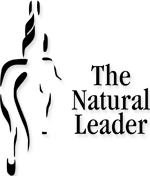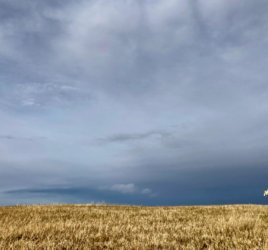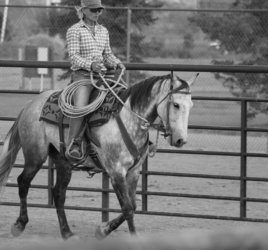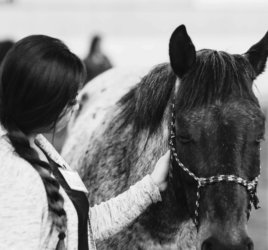Murray is a storyteller. A skill he no doubt employed over his thirty year career in the power line industry. “I would have to say storytelling comes from my father he answered most questions with a story. You had to find the answer in the story, if you didn’t you probably weren’t ready or needing the answer anyhow.”
I’ve heard many a tale this past year and we have covered many topics, most which end back at the importance of reading a horse. We share the goal of a bridle horse, Murray just happens to be a lot further along.
Horses of various breeds and functions have always been a part of Murray’s life. Retired from his most recent management position to work part-time with horses. Murray’s part time gig sounds more full time to me and he is generous with both his time and knowledge.
——
NL – What did horses teach you about working with people?
Mmc – I’ve spent most of my life in a lot of different aspects of the horse industry so probably more than anything else, was how to read and understand a horse. What a horse was like and how it was going to react without the spoken word.
So therefore, whenever I was dealing with people, while I was listening to what they were saying I spent as much time reading their bodies and how they were actually reacting to situations.
To be honest with you I could read fairly quickly whether a person was trustworthy or not or whether they were telling the truth.
Horses gave me the ability to understand human nature without somebody telling me what they were feeling or how they were going to react in certain situations. That probably was the biggest asset that horses provided me with.
——
NL – You mentioned trustworthy whether you could trust a person or not – How did that serve you through your career?
MMc – Very well! There are very few people in business you can trust. Everyone has a personal agenda and a need, two things that are the biggest drivers sex and money. One usually drives the other. If you take that away which is what horses are. They have no need for monetary gain and most geldings don’t have those drivers. So unless it’s a human taught issue just about all horses are generally trustworthy and they will never lie to you.
—–
NL – How else do you believe that horses have influenced your leadership style?
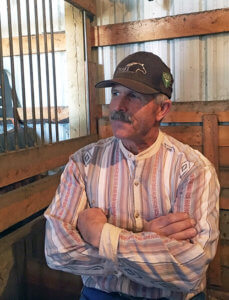 MMc – I truly believe people start out in the world honest and a lot of it is human creation that influences them so whether it’s upbringing or someone else screwing them over. There are people I’ve met that have a reputation of being not trustworthy and I have found them to be the most honest people to deal with. Given respect they will give respect and trust back – horses are very much the same way.
MMc – I truly believe people start out in the world honest and a lot of it is human creation that influences them so whether it’s upbringing or someone else screwing them over. There are people I’ve met that have a reputation of being not trustworthy and I have found them to be the most honest people to deal with. Given respect they will give respect and trust back – horses are very much the same way.
If they have had something bad happen to them, its a lot easier to get a horse to trust you than a human.
I try and give every person, horse and dog the same opportunities, trust and respect.
I can deal with the others, those who don’t have respect and aren’t trustworthy. I suppose I learned how to deal with that too through working with horses. I wasn’t given a lot of options on what I had to ride somedays you were given the horse to do the job. You still had to deal with it, just maybe deal with it in a little different manner.
With that situation you tend not to show a lot of trust because as soon as you do they will try and cheat you and will buck your ass off. You don’t give them the opportunity to do that so it’s a little more demanding to do the job.
Your expectations are never the same. You demand a little more. If your demands aren’t met you deal with them in a more immediate fashion. You don’t give them (horses) the 3 strikes your out rule. It’s one strike and then we talk. So whether it’s horses or humans you deal with it the same principle.
——
NL – If there was one thing you wish people could learn from a horses. What would that be?
MMc – Honesty. A horse doesn’t know how to lie, but we can teach them to cheat. A horse is not born a cheater, we teach him to cheat.
NL – That goes back to what you said earlier. They might have learned not to trust a boss. It’s what they have experienced before
MMc – It’s a usually a learned behavior from before your worklife, maybe school or whether it’s something in their personal life. What I always found dealing with a horse or a human everybody has a history. You want to be cognitive of that history but you don’t want to pack it more than they do
As humans we tend to pack our horses history more than the horse does. When they want to work past it we are still carrying it and we prevent them from moving forward.
We are all guilty of that at some point, you’ll hear someone say “oh you can’t do that because of…”
Just because they don’t want to get past it doesn’t mean that the horse doesn’t want to. It’s no different than in the workplace
Everyone should be given the opportunity to get past whatever it is in their history. You can’t be the one holding them back.
Thank you Murray.
Nancy Lowery has been blogging about her Leadership Learning through Horsemanship Experiences for over ten years. This series began as “One Foot in the Arena” to explore what other leaders in Calgary have learned about their own leadership through their relationships with horses.
To explore how a day with horses can complement your Leadership Training programs Nancy would love to hear from you.
